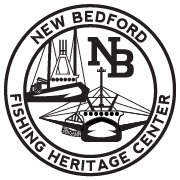The Center invites the public to bring their fishing industry related photographs, both historic and contemporary, as well as documents such as settlement sheets, union books, or news clippings to be scanned. Staff will scan the materials and record any information the owner shares about each piece. The owner will leave with their originals along with a digital copy of the scans on a flash drive. The Center is working to create a digital archive of these materials which will be made available to researchers and the public. These documents will help us to tell the story of the fishing industry.
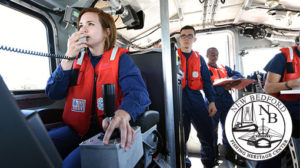
Lost and Found: Safety and Surveillance in the Fishing Industry
This discussion panel is part of the Center’s Wheelhouse Technology from Sounding Leads to Satellites exhibit and program series exploring the evolution of communication, navigation and fish finding and the impact of those changes on the fishing community. The exhibit opens on April 11th and will remain on display through July 7th.
Over the past century, new technologies have allowed New Bedford’s fleet to arrive on the grounds faster, fish safer, and communicate more easily. But at what cost? This exhibit considers the evolution and impact of technological change on the industry, the community, and the fish. In addition to considering the science behind devices such as EPIRB, SONAR, and LORAN, the exhibit and programs will consider topics such as Technology & Privacy, Dependence on Technology, and Technology & Sustainability.
This program is part of an exhibit and series exploring the evolution and impact of technological change in the fishing industry. Funding for the exhibit and program series was provided by a National Maritime Heritage Grant administered by the National Park Service, Department of the Interior, a project grant from Mass Humanities, a state agency supported by the National Endowment for the Humanities, and grants from Dartmouth, Fairhaven, and New Bedford Cultural Councils, local agencies supported by the Mass Cultural Council. The Center is grateful to Chris Electronics and the School for Marine Science and Technology for their extraordinary in-kind support, and the members of the fishing community who loaned or donated artifacts and shared their knowledge.
Trivia Night
Tease your brain! Bring a team or join one here, questions will be nautical themed (geography, astronomy, mythology, music and movies, and more!).
5 rounds of trivia, $5 beers, and $5 admission! Sponsored by Chris Electronics and Moby Dick Brewing, Co.
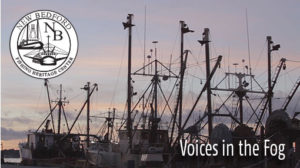
“Voices in the Fog” (2016) is a documentary research project that consists of interviews of former Portuguese cod fisherman, in which they talk about memories, stories and anecdotes of life in the high seas. The “New Bedford Chapter” introduces subjects who immigrated to the United States to build their lives and continue their careers on American soil.
The documentary features English subtitles. Director Pedro Marnoto, Assistant Director Hugo Marques and cinematography by Hugo Marques, Pedro Marnoto. Production was by PAPS (Portuguese American Post-Graduate Society), Arte Institute.
Dock-U-Mentaries is a co-production of New Bedford Whaling National Historical Park and the New Bedford Fishing Heritage Center. Films about the working waterfront are screened on the third Friday of each month beginning at 7:00 p.m. in the theater of the Corson Maritime Learning Center, located at New Bedford Whaling National Historical Park, 33 William Street in downtown New Bedford. All programs are open to the public and presented free of charge.
New England’s fishermen harvest millions of pounds of seafood each year. Anyone who has fished for any length of time has a story about something unexpected that came up in the net. From bottles, pottery, and tools to bones, fossils and even bombs, remarkable objects are continuously pulled up from the deep.
Visit us on Saturday, June 29 from 1:00pm-4:00pm while a team of maritime archeologists are at the Center examining treasures from the deep.
CALLING ALL FISHERMEN!
Have you found unexpected items in your nets or dredges and don’t know what they are? If so, bring them in and a team of maritime archeologists will be at the Center to examine your artifacts and possibly solve the mystery!
For more information please contact the Center at 508-993-8894 or email programs@fishingheritagecenter.org.
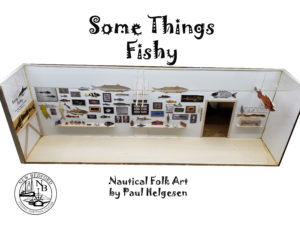
Inspired by a visit to a tiny remote island off the coast of Nova Scotia over forty years ago, Paul upcycles rough sawn lumber with found pieces of copper, brass, and steel. His works are a mixture of whimsy and realism – some of it serious and some of it ridiculous. (All pieces on display will also be for sale.)
This event will be open from July 11, 2019 through September 1, 2019.
The Center invites the public to bring their fishing industry related photographs, both historic and contemporary, as well as documents such as settlement sheets, union books, or news clippings to be scanned. Staff will scan the materials and record any information the owner shares about each piece. The owner will leave with their originals along with a digital copy of the scans on a flash drive. The Center is working to create a digital archive of these materials which will be made available to researchers and the public. These documents will help us to tell the story of the fishing industry.
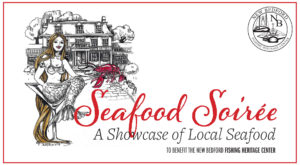
This annual event celebrates the bounty of the sea by offering attendees the opportunity to taste more than a dozen signature seafood appetizers, prepared with local seafood and seasonal ingredients by the area’s finest chefs.
Enjoy live music by The Hot Club Cheese Roll which plays a mix of jazz standards and more contemporary hits interpreted in the gypsy jazz style.
The event also features chance and live auctions, a cash bar, and dessert/coffee station.
The main focus of this event is to get the public excited about eating (local) seafood, help promote the New Bedford Seafood brand, and raise funds to support the Center’s mission of telling the story of the fishing industry past, present, and future through exhibits, programs and archives.
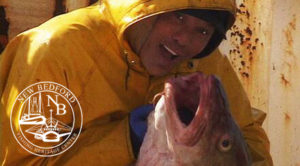
Last Season is a portrait of the ground fish trawler Isabel S. from New Bedford, MA. Jeff, the captain, learned fishing from his father, local legend ‘Fearless Freddy’ Hatfield. Brian, the cook, is a biker and a recovering alcoholic. Lo, the deckhand, is a refugee from Vietnam who has rediscovered Buddhism.
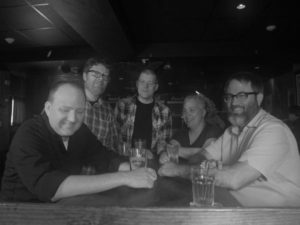
Sharks Come Crusin
One Saturday in November of 2002, in a three family tenement on Jewett Street in Providence, RI, I heard the song Spanish Ladies for the first time while watching the film “Jaws” on television. At that moment, I discovered a musical history that was a genuine to New England—something I had been in search of for years.
In December of 2003 Seth Forden joined in on bass guitar and vocal harmony. In the fall of 2004, Ed Wenzl came aboard as drummer. Paul Dube began playing accordion in 2006 shortly before we recorded “Live at Jake’s” at Jake’s Bar and Grill on Richmond Street in Providence, RI. In late summer of 2007, Eric Wohgemuth joined in on banjo and Jonathan Cannon on fiddle. In 2008 we released Four Years Before the Mast, our first studio recording.
The mission of Sharks Come Cruisin is to shed light on these forgotten songs, to remind us of a day when music and work went hand and hand, and most importantly, to bring people together to holler, shout, and sing along to songs of drinking and sinking.
